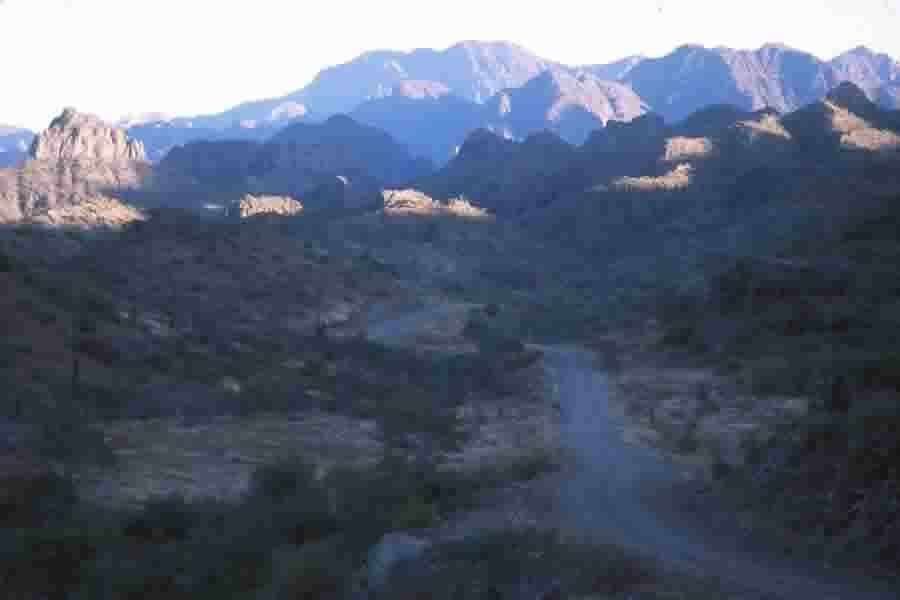
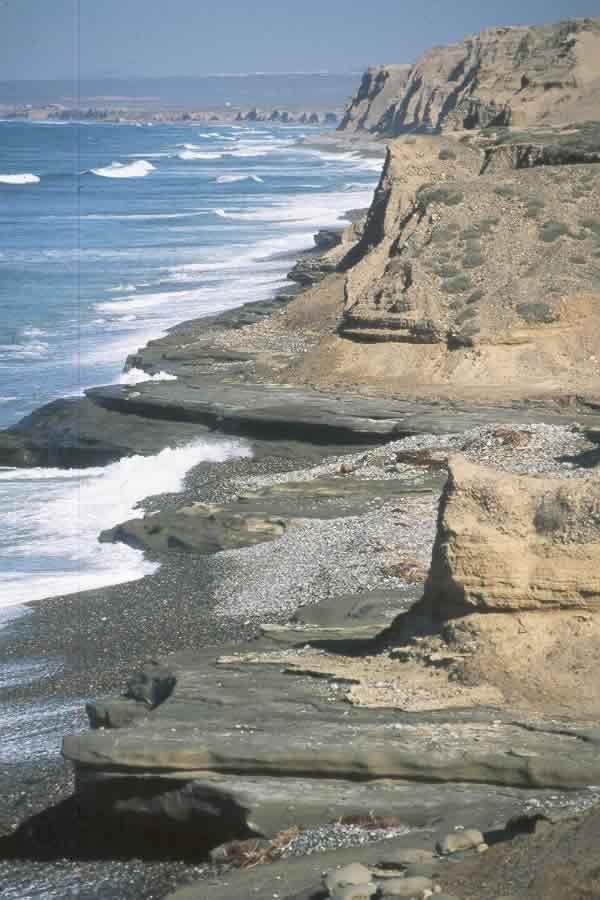
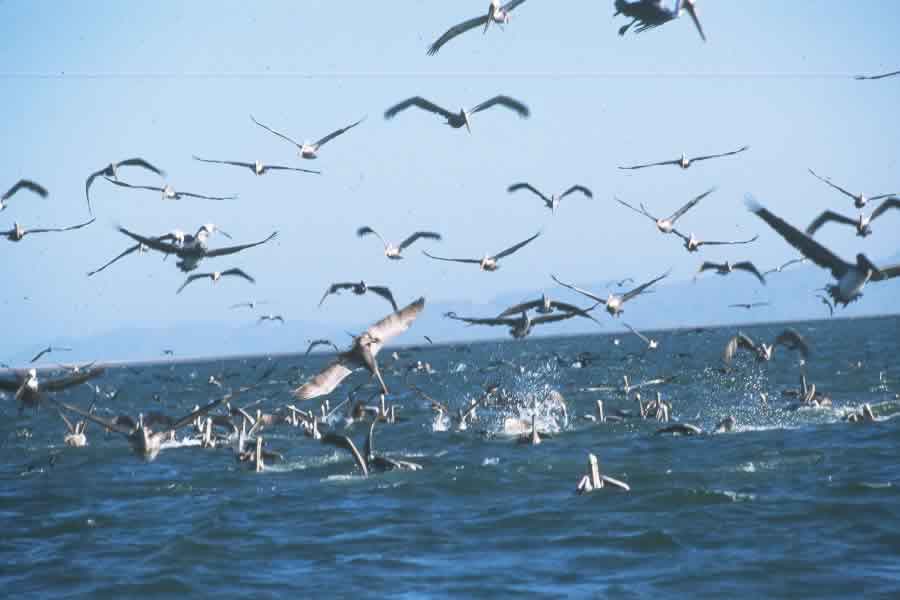
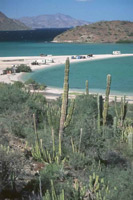
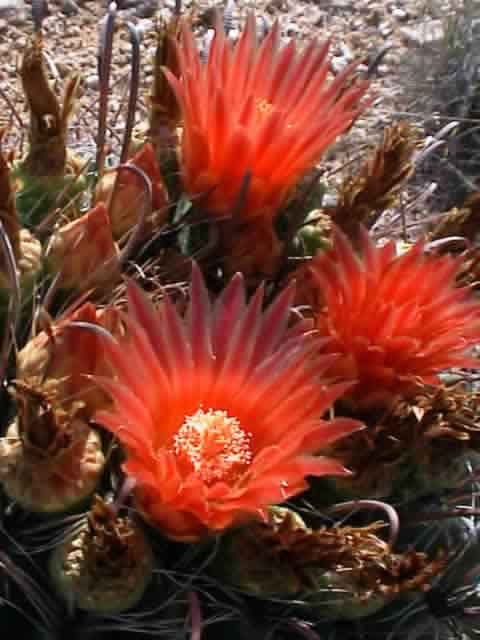
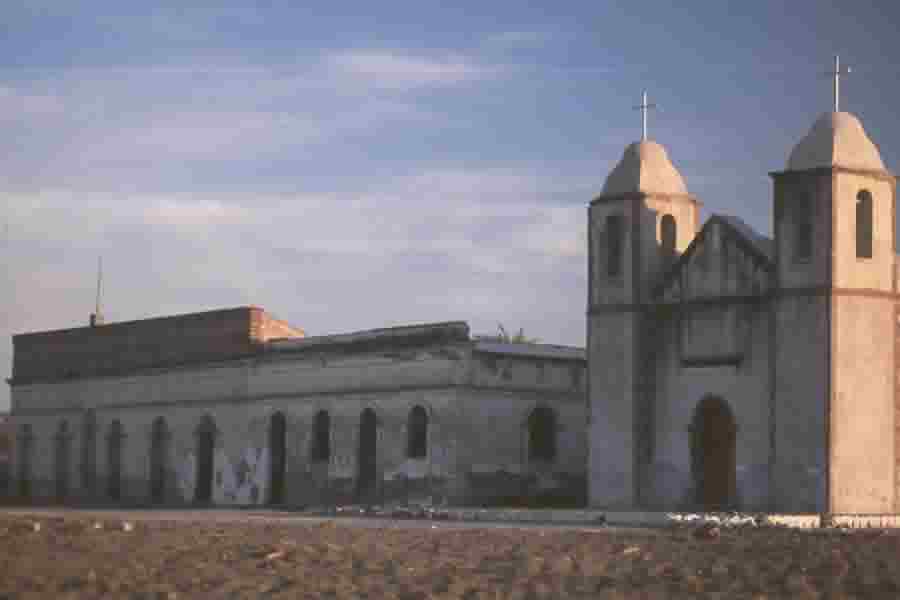
Participant Fee: $550 plus airfare to San Diego rendezvous.
Credits: 4 graduate-level credits for recertification purposes available through Colorado School of Mines (additional $130 fee); graduate level credit for Master's degree students available through Rider University.
1. Facilitator Contact Information:
Nichia Huxtable, 805 640-3677, huxtabio@hotmail.com
Fillmore High School
555 Central Ave.
Fillmore, CA 93015
David Silverberg, Ph.D. (aka Daveed), 520 731-3374, silverberg@alum.mit.edu
Environmental Learning Institute
5710 South Freeman Road #4
Tucson, AZ 85747
2. Brief Description:
The coasts and interior desert of northern Baja California are remarkable
in their diversity and beauty. In this TORCH we will explore through authentic
inquiry-based learning-research activities the incredible chaparrel communities
of the surging Pacific coast as well as the many isled xeric Sonoran desert
portion of the Sea of Cortez in the Bahia de los Angelas region. The Bahia
de los Angelos region is spectacular with it's numerous multi-colored
islands and incredibly diverse marine fauna. We will study with the Turtle
conservation project there. While traveling between the two we explore
what many consider to be the most beautiful section of the Sonoran desert,
the Valle de los Cirios Protected Area, which has remarkable plant and
animal diversity. Towering Cirios plants, several species of Elephant
trees, a remarkable cacti flora typify the region. A group of 12 intermediate-secondary
level science teachers will study desert and coastal ecosystems in Baja
California through hands-on explorations guided by local experts. The
workshop will take place during the summer (8/4-11) of 2002.
Teachers will:
· Learn about the climate, flora, fauna, and geology of Baja's
coastal and desert ecosystems.
· Become familiar with global and local threats to these ecosystems.
· Learn the Grinnel system of field journaling.
· Learn a variety of field research techniques that can be applied
in the classroom as well as in the field with their students.
· Experience inquiry-based learning first-hand and develop inquiry-based
lessons for their own classrooms.
· Be encouraged to establish long-term professional connections
with each other and local experts.
· Participate in professional forums on inquiry-based science,
alternative assessment, and constructivist pedagogy in the science classroom.
· Contribute to the creation of a world wide web site that will
illustrate the philosophy, pedagogy and experiences of the workshop.
3. Participant Fee: A
comprehensive fee of $550.
The Environmental Learning Institute provides course transport from the San Diego rendezvous to Baja California, Mexico, on-course travel, food, cooking equipment, tents, lodging, protected area fees, course reader and all scientific and research equipment.
†This fee does not include airfare from the participantís home to and from San Diego, personal clothing, personal equipment expenses, personal expenses or optional travel.
Rendezvous: 2 PM, Sunday, August 4, San Diego Airport.
Dropoff: 11 AM, Sunday, August 11, San Diego Airport. (Therefore book return flights 1 PM)
4. Number of participants: 12
5. Site description:
oThe 8 days of the institute will be spent traveling to and from and staying
in Baja California, Mexico.
oDays 1-3 the group will meet in San Diego, CA and then caravan to Erindera
(south of Ensenada), Baja California and stay three nights at Rancho Ejido
while working nearby on the Pacific Coast.
oDays 4 & 5 the group will caravan to Catavina, Baja California and
camp two nights while working nearby in the desert.
oDays 6 & 7 the group will caravan to Bahia de Los Angeles, Baja California
and camp two nights while working nearby on the Sea of Cortez.
oDay 8 the group will drive back to San Diego, CA and then home.
6. Levels of teacher-participants: Participants may be pre-service or in-service teachers of secondary level life science, integrated science, biology, or environmental science.
7. Structure of workshop:
From August 4 - 11, we will travel South along the Pacific coast into Baja, then across the deserts of Baja, and North along the Sea of Cortez until we re-enter California. For those eight days, participants will attend content lectures and guided hikes and undertake field studies in both coastal and desert ecosystems. Our days are filled with field work, our evenings include lively text-based discussions of inquiry-based learning, expeditionary learning, team development models, global environmental change.
8. Content Knowledge Topics: Natural Ecosystems and Ecological Concepts
This course provides an overview of Baja California Norte, Mexico natural arid and coastal ecosystems: what they are; how they work; and how they evolve and adapt to change. Ecosystem structure and function, as well as ecosystem development and dynamic equilibrium are integrated into a central theme of sustainability from a local and global perspective. Particular emphasis will be given to the ecology of Baja Califonia Norte's Pacific and Gulf Coasts , the Sonoran Desert of Valle de Cirios Protected Area and the deserts and arid shrub lands of southern California, United States. Biosphere, lithosphere, atmosphere interactions and exchanges within the coastal zone and desert biomes are introduced as related to issues of local and global environmental change. The philosophy, pedagogy and learning activities of the course employ a standards- and inquiry-based approach.
Lectures include:
Environmental History of Mexico
Experimental Design and Data Interpretation
Coastal Environmental Change
Causes and Consequences of Biodiversity
Geologic and Physical Geographic Development of the Baja Peninsula
Corridors and Global Climate Change
Mexico and Global Environmental Change
Habitat Fragmentation and Degradation
How Deserts Work
Mexico's Protected Areas and Communities
9. Curriculum materials:
Each participant will receive a binder in which to put all course handouts.
Included will be readings on global change and current environmental issues
in desert and coastal ecosystems, both global and local. Maps and field
guides for each field site as well as descriptions of common field techniques
and their applications will also be included. In addition, teachers will
receive handouts regarding pedagogy, such as ways in which inquiry based
learning may be implemented in the classroom.
10. Field Equipment: Our field lab includes several notebook computers, TI-89 graphing calculators, a full set of Vernier calculator and computer-based laboratory probes and standard geological and biological survey equipment. A digital projector, compasses, underwater writing tablets, barometers, digital cameras, mini-DV camcorders, 35 mm SLR, microscopes.
11. Food and Lodging: We will be cooking in field camps and basic palapas along the ocean and in the desert. Participants will be asked to help the camp manager with cooking and cleaning chores in rotation. We will be camping in tents and using sleeping bags. You need to bring your own sleeping bag. Two person tents are provided, though you are welcome to bring your own if you prefer.
12. Physical Fitness Requirements: The Baja California TORCH course involves hiking in the desert at elevated temperatures, dayhiking with a 20 pound daypack, hiking on trails and off-trails, traveling in a van for several hours on sometimes curvy coastal and mountain roads, †traveling in a motorboat on a choppy water surface.† Participants will sleep in tents, in sleeping bags with sleeping pads on the ground.†